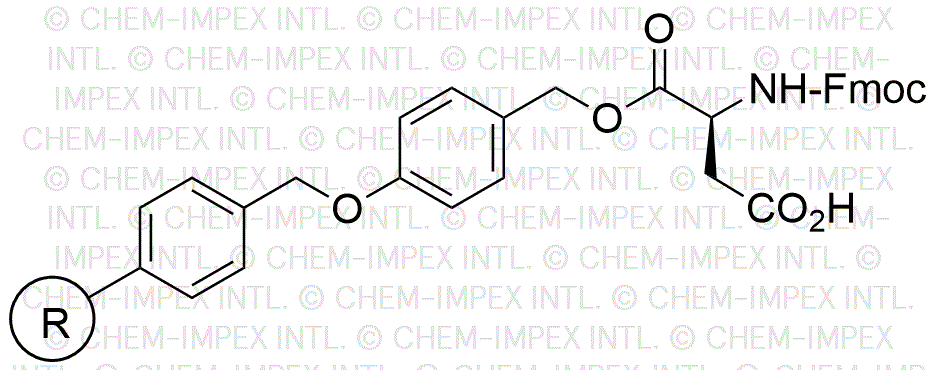Fmoc-L-aspartic acid 4-alkoxybenzyl alcohol resin is widely utilized in research focused on
- Peptide Synthesis: This resin is essential in solid-phase peptide synthesis, allowing for the efficient assembly of peptides with high purity and yield.
- Drug Development: It serves as a key component in the creation of peptide-based drugs, facilitating the development of therapeutics that target specific biological pathways.
- Bioconjugation: The resin is used in bioconjugation processes, enabling the attachment of peptides to various biomolecules, which is crucial for creating targeted drug delivery systems.
- Research in Neuroscience: It aids in the synthesis of neuropeptides, contributing to studies that explore neuronal signaling and potential treatments for neurological disorders.
- Custom Peptide Libraries: Researchers utilize this resin to create diverse peptide libraries for screening and discovery, enhancing the ability to identify novel bioactive compounds.
General Information
Properties
Safety and Regulations
Applications
Fmoc-L-aspartic acid 4-alkoxybenzyl alcohol resin is widely utilized in research focused on
- Peptide Synthesis: This resin is essential in solid-phase peptide synthesis, allowing for the efficient assembly of peptides with high purity and yield.
- Drug Development: It serves as a key component in the creation of peptide-based drugs, facilitating the development of therapeutics that target specific biological pathways.
- Bioconjugation: The resin is used in bioconjugation processes, enabling the attachment of peptides to various biomolecules, which is crucial for creating targeted drug delivery systems.
- Research in Neuroscience: It aids in the synthesis of neuropeptides, contributing to studies that explore neuronal signaling and potential treatments for neurological disorders.
- Custom Peptide Libraries: Researchers utilize this resin to create diverse peptide libraries for screening and discovery, enhancing the ability to identify novel bioactive compounds.
Documents
Safety Data Sheets (SDS)
The SDS provides comprehensive safety information on handling, storage, and disposal of the product.
Product Specification (PS)
The PS provides a comprehensive breakdown of the product’s properties, including chemical composition, physical state, purity, and storage requirements. It also details acceptable quality ranges and the product's intended applications.
Certificates of Analysis (COA)
Search for Certificates of Analysis (COA) by entering the products Lot Number. Lot and Batch Numbers can be found on a product’s label following the words ‘Lot’ or ‘Batch’.
Numéro de catalogue
Numéro de lot/série
Certificates Of Origin (COO)
This COO confirms the country where the product was manufactured, and also details the materials and components used in it and whether it is derived from natural, synthetic, or other specific sources. This certificate may be required for customs, trade, and regulatory compliance.
Numéro de catalogue
Numéro de lot/série
Safety Data Sheets (SDS)
The SDS provides comprehensive safety information on handling, storage, and disposal of the product.
DownloadProduct Specification (PS)
The PS provides a comprehensive breakdown of the product’s properties, including chemical composition, physical state, purity, and storage requirements. It also details acceptable quality ranges and the product's intended applications.
DownloadCertificates of Analysis (COA)
Search for Certificates of Analysis (COA) by entering the products Lot Number. Lot and Batch Numbers can be found on a product’s label following the words ‘Lot’ or ‘Batch’.
Numéro de catalogue
Numéro de lot/série
Certificates Of Origin (COO)
This COO confirms the country where the product was manufactured, and also details the materials and components used in it and whether it is derived from natural, synthetic, or other specific sources. This certificate may be required for customs, trade, and regulatory compliance.

